book2unit2
大学泛读Book2Unit-2-Music教学内容

Folk music
• Music originating among the common people of a nation or region and spread about or passed down orally, often with considerable variation.
1. The topic being discussed in the short passage above is ---
Caring about the world by musicians and music fans
2. The writer’s main idea is--Musicians and music fans became concerned
• 乡村音乐:基于美国南部乡村风格上的流 行音乐或基于美国西部牛仔的音乐的流行 音乐, 也作 country and western
Themes in country music
• Love • Cowboy • Happiness-seeking • The living style of countryside • Regional pride • Family • God • Nation
in 1960s
Cultural Notes
• country musicቤተ መጻሕፍቲ ባይዱ• folk music
Country music
• Popular music based on the folk style of the southern rural United States or on the music of cowboys in the American West. Also called country and western
现代大学英语精读第二版book2unit2学习资料
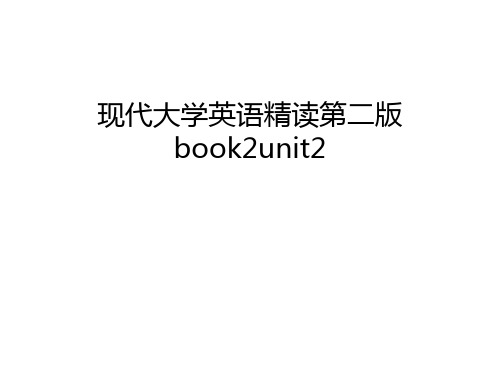
• B.A. (1972) and M.A. (1975) from Oxford University with First Class Honors in English, a second M.A. from Stanford.
• Born in Alabama USA in 1945. • Parents divorced when he was a
boy; traveled widely with his mother; soon forced to endure life under his strict and cruel stepfather.
much as possible. • Think about the themes of the story and form your
own opinions.
Say Yes
Author
Unit 2
Time
Background
Genre
Culture Tips
Background
His Life
• Non-dramatic, focusing more on the psychological dimensions of a character in dilemmas than on plot development
• Often understated, forcing readers to become engaged in the collection of strands that will result in the full comprehension of a story.
2021高考英语大一轮复习资料 Book2 Unit2
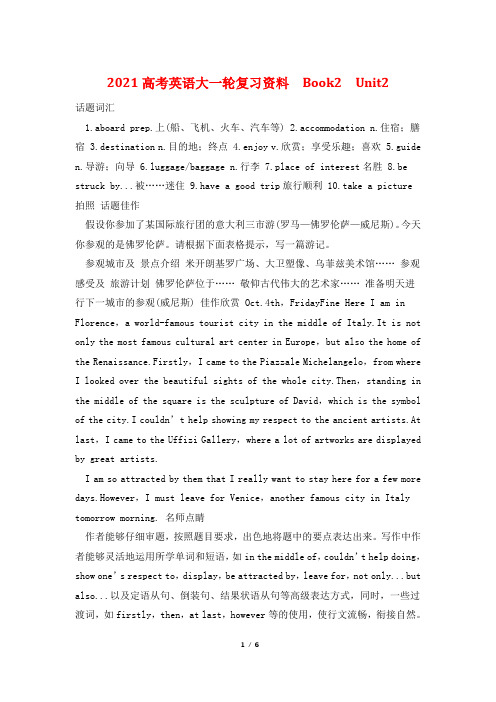
2021高考英语大一轮复习资料Book2 Unit2话题词汇1.aboard prep.上(船、飞机、火车、汽车等)2.accommodation n.住宿;膳宿3.destination n.目的地;终点4.enjoy v.欣赏;享受乐趣;喜欢5.guide n.导游;向导6.luggage/baggage n.行李7.place of interest名胜8.be struck by...被……迷住9.have a good trip旅行顺利 10.take a picture拍照话题佳作假设你参加了某国际旅行团的意大利三市游(罗马—佛罗伦萨—威尼斯)。
今天你参观的是佛罗伦萨。
请根据下面表格提示,写一篇游记。
参观城市及景点介绍米开朗基罗广场、大卫塑像、乌菲兹美术馆……参观感受及旅游计划佛罗伦萨位于……敬仰古代伟大的艺术家……准备明天进行下一城市的参观(威尼斯) 佳作欣赏 Oct.4th,FridayFine Here I am in Florence,a world-famous tourist city in the middle of Italy.It is not only the most famous cultural art center in Europe,but also the home of the Renaissance.Firstly,I came to the Piazzale Michelangelo,from where I looked over the beautiful sights of the whole city.Then,standing in the middle of the square is the sculpture of David,which is the symbol of the city.I couldn’t help showing my respect to the ancient artists.At last,I came to the Uffizi Gallery,where a lot of artworks are displayed by great artists.I am so attracted by them that I really want to stay here for a few more days.However,I must leave for Venice,another famous city in Italy tomorrow morning. 名师点睛作者能够仔细审题,按照题目要求,出色地将题中的要点表达出来。
人教版初中英语教材课文要点解析Book 2Unit 2The Olympic Games

Book 2Unit 2The Olympic Games词汇积累分层单词▶写作词汇1.n.志愿者;志愿兵adj.志愿的;义务的vt. & vi.自愿2.n.祖国;本国3.vt.取代;替换;代替4.vt. & vi.收费;控诉n.费用;主管5.adj.物理的;身体的6.vt. & vi.做广告;登广告7.vi. & vt.应受(报答或惩罚);值得8.vi.比赛;竞争答案 1.volunteer 2.homeland 3.replace 4.charge 5.physical 6.advertise7.deserve pete▶阅读词汇1.ancient adj.2.medal n.3.basis n.4.athlete n.5.nowadays adv.6.stadium n.7.host vt. n.8.swift adj.9.fine vt.10.poster n.11.bargain vi. n.12.gymnastics n.(pl)13.motto n.14.glory n.15.pain n.答案 1.古代的;古老的 2.奖章;勋章;纪念章 3.基础;根据 4.运动员;运动选手 5.现今;现在 6.体育场7.做东,主办,招待主人8.快的;迅速的9.罚款10.海报;招贴11.讨价还价,讲条件便宜货12.体操;体能训练13.座右铭;格言;警句14.光荣;荣誉15.疼痛;痛苦▶拓展词汇1.vi.比赛;竞争→n.竞争→adj.竞争的;有竞争力的→n.竞争者2.adj.规则的;定期的;常规的→adv.定期地;有规律地3.vt. & vi.容许;承认;接纳→n.准许加入;入场费4.n.责任;职责→adj.负责的5.adj.愚蠢的;傻的→n.傻瓜vt.欺骗;愚弄答案 pete;competition;competitive;competitor 2.regular;regularly 3.admit;admission 4.responsibility;responsible 5.foolish;fool高频短语1.参加;参与2.代表;象征;表示3.也;又;还4.一个接一个地5.拾起;捡起;用车接某人6.代替……7.在……中起作用8.主管;看管;负责9.除了……外答案 1.take part in 2.stand for 3.as well 4.one after another 5.pick up 6.take the place of 7.play a role in8.in charge9.apart from经典句型1.I lived in(你们称之为……的地方)“Ancient Greece” and I used to write about the Olympic Games a long time ago.2.(正是在夏季奥运会上)you have the running races, together with swimming, sailing and all the team sports.3.No other countries could join in,(奴隶和妇女也不能参加)!4.Women(不仅被允许参加,而且还在……中起着非常重要的作用)gymnastics, athletics, team sports and...5.There’s(争取奥运会承办权的竞争就跟……一样激烈)to win Olympic medals.6.She was very beautiful and could(比任何一个男人跑得都快)in Greece.7.She(如此生气以至于)she said to her father that she would not marry anyone who could not run faster than her.8.This is important because(你说的英语越多,你的英语就会越好).答案 1.what you call 2.It’s in the Summer Olympics that 3.nor could slaves or women4.are not only allowed, but play a very important role in5.as much competition among countries to host the Olympics as6.run faster than any man7.was so angry that8.the more you speak English, the better your English will becomeBook 2Unit 2The Olympic Games课文与语法填空阅读下面短文,在空白处填入1个适当的单词或括号内单词的正确形式。
大学英语Book 2 Unit 2课文
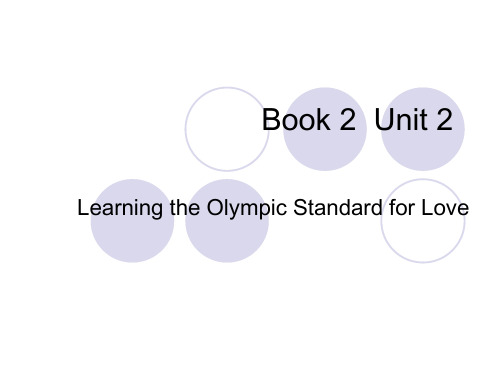
2
2
6. He never asked this of me again, nor did he take much notice of my outburst. (para.13)
take notice of: pay attention to She took little notice of his manner, good or bad. Translation: 老委员们对我说的话不予理会。 The old members of the committee took no notice of what I said.
General Statement: He never babied me. Supporting Details: I : massive headache; quite fatigue; going to die Nikolai : indifferent to my pain; … ski, ski, ski.
More
2
2
Notes to the Text—Focus Study
More expressions By no means
neither/little/only/hardly seldom not only not until under no circumstances no sooner ... than ... scarcely (hardly) ... when ...
2
2
3. I could always count on being encouraged by Nikolai’s amusing stories and sense of humor. (para.5)
count on: rely on; depend on Translation: 我以为我可以依赖家庭的支持,但是我错了。 I had thought I could count on the support of my family; but I was wrong. 经理需要一个可以信赖的助手,在他外出时,由助手负 责处理问题。 The manager needs an assistant that he can count on to take care of problems in his absence.
第三版视听说教案book2unit2
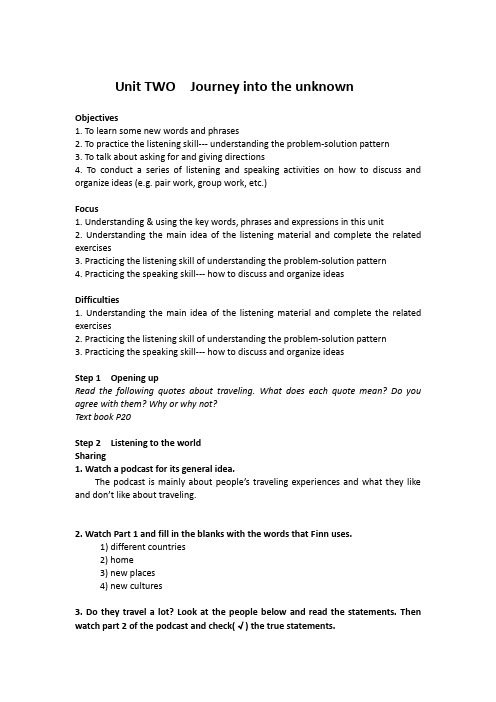
Unit TWO Journey into the unknownObjectives1. To learn some new words and phrases2. To practice the listening skill--- understanding the problem-solution pattern3. To talk about asking for and giving directions4. To conduct a series of listening and speaking activities on how to discuss and organize ideas (e.g. pair work, group work, etc.)Focus1. Understanding & using the key words, phrases and expressions in this unit2. Understanding the main idea of the listening material and complete the related exercises3. Practicing the listening skill of understanding the problem-solution pattern4. Practicing the speaking skill--- how to discuss and organize ideasDifficulties1. Understanding the main idea of the listening material and complete the related exercises2. Practicing the listening skill of understanding the problem-solution pattern3. Practicing the speaking skill--- how to discuss and organize ideasStep 1 Opening upRead the following quotes about traveling. What does each quote mean? Do you agree with them? Why or why not?Text book P20Step 2 Listening to the worldSharing1. Watch a podcast for its general idea.The podcast is mainly about people’s traveling experiences and what they like and don’t like about traveling.2. Watch Part 1 and fill in the blanks with the words that Finn uses.1) different countries2) home3) new places4) new cultures3. Do they travel a lot? Look at the people below and read the statements. Then watch part 2 of the podcast and check(√) the true statements.1 Travel is her passion.2 He has been to Istanbul twice.3 She has done little traveling on holidays.4 She gets excited about going to any country.5 She loves to travel to different countries.6 He has been traveling for 12 years.7 She has been to Turkey, India, and Malta.8 As an expedition leader, he often works in the United Kingdom.Answers1 √2(He has been to Istanbul once.)3(she has done quite a bit of traveling on holidays.)4 √5 √6(He has been traveling for about two and a half years.)7(she has been to Turkey, Egypt and Malta.)8(As an expedition leader, he often works outside the United Kingdom.)4. What do they like about traveling? Look at the people below and read the statements. Then watch part 3 of the podcast and fill in the blanks.A He thinks that traveling helps a person 1_______a lot and learn completelydifferent experiences.B She loves the 2______experience.C He loves to see art. And she loves to see 3________in other countries.D He can see the most beautiful4 ________ around the word.E He likes getting out there and experiencing a different 5____, getting far a wayfrom what he’s used to, and meeting new people.F She loves being in a new place, seeing very different things, hearing a different6_____, and eating different food.Now watch again and check your answers.4 Answers1) mature2) airport3) theater4) scenery5) culture6) language5 What don’t they like about traveling? Look at the people below and read the statements. Then watch part 4 of the podcast and match the statements 1-6 to the people A-F.1 I suppose plane journeys aren’t always the most exciting of things.2 I don’t like long flights.3 When I was backpacking, and we all …we ran out of money, or we were in dangerous situations, I actually quite enjoyed that.4 Flying. I don’t particularly like flying, but it’s a necessity when you live in Ireland, you know.5 You spend a lot of time outside the United Kingdom, and the disadvantage of that is, that you, you tend to miss families and friends.6 I suppose the biggest problem I have with traveling is living out of a suitcase.Now watch again and check your answers.AnswersBAECFD6. Work in pairs and discuss the questions.1. Do you like traveling? Why or why not?2. Have you traveled much? Where have you been? What did you like most?3. If you can afford the money and time, which place(s) would you love to go? Why? Reference answers1. I like traveling a lot. It is a good experience since it helps people escape from the pressure of city life and the boredom of daily routine. What’s more, the contact with different cultures helps broaden the mind and probably change our way of living and thinking.I don’t like traveling. I like the stability and the secure, warm feeling of home, which make me feel comfortable. Hotels or other people’s houses are poor substitutes for home, and I really don’t like sleeping in strange places or being away from home for a long time. I don’t get enough out of traveling to justify the discomfort of being away from home.2. I haven’t traveled much so far, but the backpacking trip I had in Yunnan is an unforgettable experience. I walked on foot along the Yangtze river for a long distance, occasionally going down to the valley to appreciate its majestic power and beauty. What I liked most was to drift along the river on a bamboo raft. It seemed to me that the river had a life of its own with the current either drifting in leisure or raging forward with force. Tiring as the trip was, I was greatly rewarded with what I felt and what I experienced.3. If I had enough time and money, I would choose to go to the American west, to visit the deserts, the canyons, and the mountains, and to totally get immersed into the wilderness. Probably only by going deep unto nature can we truly find our true self, our real value, and our relation with others and the world.Step 3 ListeningBEFORE you listen1.Work in pairs and discuss the questions.What do you know about Venice?Venice is a city in danger. What do you think the major problem might be? Listening skillsWHILE you listen2. Read the questions. Then listen to a man’s talk and answer the questions.1 what problem is Venice facing now?2 how serious is the problem?3 what measure is being adopted to save the city?4 what does the speaker think of the measure?5 what advice does the speaker give in order to save the city?Reference answers1 the city is slowly sinking.2 Venice is sinking at a rate of two and a half inches every decade.3 barriers are being put in to try and stop the water getting too high.4 it is a temporary measure.5 put pressure on the government to spend the money it needs to find a permanent solution to the problem.3. Listen to the talk again and check(√) the true statements.Answers1 (ever since the 14th century attempts have been made to save Venice.)2 (there are as many as 40 floods in Venice between march and September every year.)3 √4 √5 √After you listen4. Work in pairs and discuss the questions.1 Can you think of any other problems threatening tourist cities around the world?2 In your opinion, what measures should be taken to tackle the above problems? Step 4 ViewingBefore you view1 Read the program information below and answer the questions.1 What do you know about the five places mentioned in the following program,information?2 Which places do you think is the number one place to see?2 read the statements and the answer choices. Then watch the video clip and choose the best answers.1 According to the program, Bangkok is an important place for____.A tourists around the worldB people of ThailandC temple loversD Buddhists2 To Joanna Lumley, the Masai Mara is so special because___.A it is a fantastic place for studying animal behaviorB the open spaces and wild animals are impressiveC the African sky is particularly cleat and blueD the animals there live in complete freedom……Answers1 D2 B 3B 4C 5D3Read the statements. Then watch the video clip again and fill in the blanks.1With over six million people, it’s big, it’s______and you love it! It’s very good for ____ and the nightlife is great, too.2It’s got lots of clubs, ______, shops, food… everything you _____, really.3Huge open ______ , fantastic animals, just wide open freedom, warmth, _______, and all underneath the great African skies.4To me, Paris is ______, romantic and ________.5And behind Cape Town is the 1,000-meter-high table mountain, with its fantastic_______.6Friendly people, loads of _______.7With every ________ inch of the ______, the colors in the canyon change.8I remember actually sitting there…and I just______.Now watch again and check your answers.Answers1 busy, shopping2 bars, need3 spaces, friendliness4 elegant, expensive5 views6 beaches, cheap7 changing, sunset8 cried4. Discuss the questions.1. Which places in the world would you like to visit? Make a list of three places and give your reasons.2. Which attracts you more: a natural or cultural landscape? Why? Assignments:1. Reviewing new words and phrases of Unit 12. Listening to “Further Practice in Listening” again after class.3. Working in pairs and practice how to discuss and organize ideas.。
B2U2练习
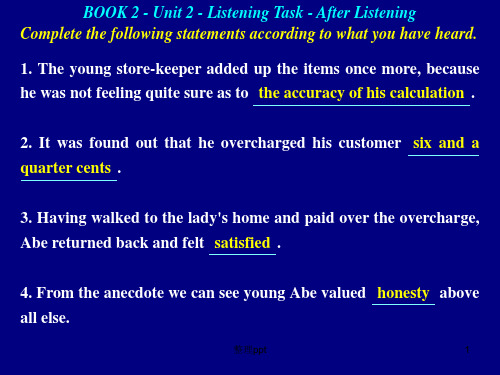
8. What did the girl tell him before her visit to his basement apartment? And what happened after? {[She told him that she was interested in what’s on the inside. But after he took her to his poorly furnished apartment, she changed her mind completely.}]
整理ppt
3
BOOK 2 - Unit 2 - Comprehension - Content Questions 5. Is the writer poor or not in terms of material possessions? Give facts to support your conclusion. {[Yes, economically he is poor. He lives in a small basement apartment. He doesn’t even have a color TV. He falls into the lowest income category. And so on.}]
2. It was found out that he overcharged his customer {[six and a quarter cents}].
新视野大学英语读写教程(第三版)Book2-unit-2-课文原文及翻译
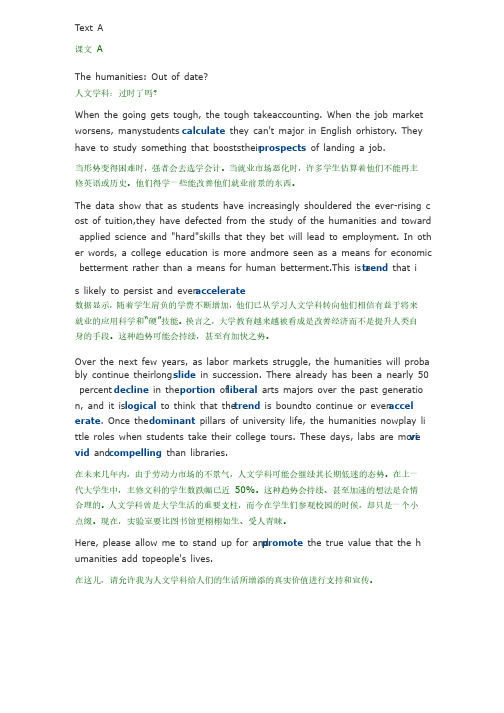
Text A课文AThe humanities: Out of date?人文学科:过时了吗?When the going gets tough, the tough takeaccounting. When the job market worsens, manystudents calculate they can't major in English orhistory. They have to study something that booststheir prospects of landing a job.当形势变得困难时,强者会去选学会计。
当就业市场恶化时,许多学生估算着他们不能再主修英语或历史。
他们得学一些能改善他们就业前景的东西。
The data show that as students have increasingly shouldered the ever-rising c ost of tuition,they have defected from the study of the humanities and toward applied science and "hard"skills that they bet will lead to employment. In oth er words, a college education is more andmore seen as a means for economictrend that i betterment rather than a means for human betterment.This is as likely to persist and even accelerate数据显示,随着学生肩负的学费不断增加,他们已从学习人文学科转向他们相信有益于将来就业的应用科学和“硬”技能。
- 1、下载文档前请自行甄别文档内容的完整性,平台不提供额外的编辑、内容补充、找答案等附加服务。
- 2、"仅部分预览"的文档,不可在线预览部分如存在完整性等问题,可反馈申请退款(可完整预览的文档不适用该条件!)。
- 3、如文档侵犯您的权益,请联系客服反馈,我们会尽快为您处理(人工客服工作时间:9:00-18:30)。
admit
sth/ doing 承认某事,承认做了...... having done 承认做过......
that从句
It is/was admitted that...普遍认为...... admit sb/sth to be... 承认某人/某物是......
Hewas ______________ admitted as a member of the basketball team. 他被接受成为篮球队的一名队员。 Only 200 children ___________________ were admitted to/into the sc hool every year. 那时每年只有200名儿童获准入学 having broken the window? 你 Will you admit _______________ 承不承认你打破了窗户?
1) as well 为副词=also,too,用于句末,意思为“也”; may (just) as well do 不妨干…… as well as 不但…而且…、既…又…、和 连词,连接主语、宾语、表语或状语等并列成分, 一般不可置于句首,其侧重点在于前者。 as well as连接两个主语时,谓语动词的数须与前 面的主语保持一致。就远原则:(together/along )with;rather than;except;besides;but; including;in addition to;apart from as well as连接两个谓语动词时,前后动词的时态 须保持一致。 as well as连接两个不定式时,若第一个带to,则a s well as后的不定式通常省略to。
4.charge vt.& vi.收费,控诉,充电;n.费用,主管 cha
rge sb. for sth.收费,要价
with sth./doing...指控某人做...... charge sb. ______ in ______charge of 主管 ,负责 in the ______charge of ...由......负责/掌管 take charge of 主管,负责 free of charge 免费 1. The man has been charged ______ with murder. 2. What did he charge ______ for the repairs? 3. He forgot to charge the battery. 4. A week later, I volunteered to in charge of Egli take sh study in my class.
He admitted _______ the novel. CD A. into read B. to have read C. reading D. having read
3. replace vt. 代替;取代 replace sb./sth. =take the place of代替,取代 take one's place= take the place of in place of = in one's place replaced by computers i Teachers will never be ___________ n the classroom. 课堂上电脑永远不会取代老师。 as the local teacher. She replaced her friend ____ 她取代她的朋友成了当地的老师。 with/by new ones I replaced the worn-out tools ________ . 我用新工具来替换那磨损不堪的。
Unit 2 The Olympic G ames
1. compete vi. 比赛;竞争,对抗。 compete in sth. 参加……比赛,在……竞争 compete for _____________ 为......而竞争 with/against 与……竞争 compete ___________ competitor 参赛者;n. ___________ competition 竞争 n. _________ competitive adj. _____________ 竞争的,竞争性的
every four years 每四年 every+基数词+复数名词 every+序数词+单数名词 every+other+单数可数名词 每隔一...... every few+复数名词
1. I lived in what you call “Ancient Greece”. 我生活在你们所说的“古希腊”. what you call “Ancient Greece”是由 what 引导 的宾语从句,在介词 in 之后作宾语。 what 引导的名词性从句可以在句中做宾从,主 从,表语从句。常被翻译成“......的人、事、地 方、样子等......” 他不再是他原来的样子了。 He is no longer _______________. what he was 他们已经做了他们能做的去帮助他。 what they can to help her They’ve done ___________________________ .
1. John, as well as his friends,______yet hasn’t read the book. (不曾读过) discussing 2. They are watching TV as well as ___________ (discuss)the problem. 3. I came to see him as well as _______(learn) of learn the truth. 4. He wrote to you as well as____ me . (我) 5 .As well as breaking the leg, he hurt his arm. 除了......之外 6. Not only he but also we_____ are fond of the popu lar song.
2. No other countries could join in, nor could slav es or women!别的国家不能参加,奴隶和妇女 也不能参加。
neither/nor+助动词/情态动词/be 动词+ 主语 常用于否定陈述句之后,表示“(另一个人)也 不”.
我没去过纽约,简也没去过。 has Jane. I have never been to New York, neither/nor __________________ 我根本不相信她说的话,她妈妈也不相信. neither did her I didn’t believe a word she said,______________ mother. ______________.
She is clever, but she doesn’t work hard. So it is with her brother(=It is the same with her brother) 她很聪明,但学习不努力;她的弟弟也是这样.
compete in the English contest. eg. I hope to___________ 我盼着去参加英语竞赛。 compete with We can’t _____________them on price. 我们在价格上无法与他们竞争。
2. admit vt.& vi.准许进入,容许,接纳(常用被动) as … 被接受为…… be admitted ____ (to/into) be admitted___________ 被准许进入
1)“so+助动词/情态动词/be 动词+主语”常用于肯 定陈述句之后,表示“(另一个人或物)也是。 主语变. 我想和你分享我的快乐,玛丽也是。 so does I want to share my happiness with you,________ Mary . _____ (2)“so+主语+助动词/情态动词/be 动词”用于肯 定陈述句之后,表示赞成前一说话者所说的内 容,可译为“是的;的确如此”,主语不变。 —It was cold yesterday. —So__________. it was (3) so it is with sb/It is the same with sb结构陈述 两种或两种以上的情况,既可用于肯定,也可 用于否定.
6. deserve vi&vt. 应受(报答或惩罚);值得 deserve consideration/attention 值得考虑/注意 deserve to do/to be done 应该(被)做......;值得(被) 做 You deserve it! 活该/你应得的
高频短语: in charge make a bargain with pick up work out apart from one after another take the place of take part in sta置 out of place 在不适当的位置 take place 发生,举行 instead of 代替,而不是(介词短语) A Bob is ill today. Who can ________ him in our fo otball match? A. replace B. take place C. instead of D. in the place of
5. bargain vi. 讨价还价,讲条件;n. 便宜货 bargain with sb. about/over/for sth 同某人就某事 讨价还 make a bargain (with sb.) (和某人)达成协议 a good/bad bargain 买的合算/ 不合算 That's a bargain. 就这样说定! eg. I bargained _______the texi driver ______ with over th e price.
